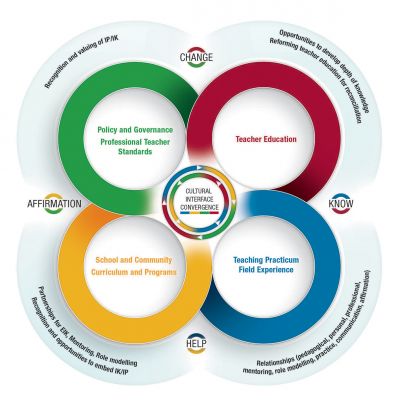In 2010-2013 QUT, in partnership with Griffith University, conducted a research project investigating how to better support future curriculum leaders in embedding Indigenous knowledges on teaching practicum.
The researchers spoke to preservice teachers and their supervising school teachers about their pedagogical relationships (e.g. negotiating expectations and role modelling) and their experiences developing expertise in Indigenous knowledges and perspectives and embedding them in their teaching practice.
The project developed a model for the process of supporting embedding Indigenous knowledges in teaching practice. The model describes the relationships and interactions between four contexts (policy, governance and professional teachers standards; teacher education, school and community curriculum and programs; and teaching practicum and professional experience) and four themes (change, know, help and affirmation).
The cultural interface
At the centre of the model is cultural interface convergence, 'the locale of the learner, a place of agency, a place of tension... but also a space for convergence of knowledge systems' (Nakata, 2002, 2011).
Engagement with Aboriginal and Torres Strait Islander perspectives can occur in multiple ways, over time and place. Indigenous knowledges then are a contested, ever-changing corpus of knowledge that Nakata (2007) argues is able to be understood by both Indigenous and non-Indigenous peoples, as their knowledge systems interface.
Contexts
Policy, governance, and professional teacher standards: recognition and valuing of Indigenous knowledges
Aboriginal and Torres Strait Islander perspectives and knowledges have gained traction in recent times at all levels of Australia's education system. This movement has been made possible through national policy shifts as a result of much political activism by Aboriginal and Torres Strate Islander leadership and community networks.
In recent times, policy statements and professional standards have facilitated a national consciousness, to recognise and value Aboriginal and Torres Strait perspectives and knowledges in the education system and curricula.
Frameworks and ways of knowing
Teacher education: developing in-depth knowledge of Indigenous knowledges
Preservice teacher education maintains a societal moral contract in the education of future curriculum leaders as they embark on educating future citizens, leaders and productive members of communities, local and beyond.
Teacher knowledge, personal and professional commitment to Indigenous knowledges, and preparedness to navigate the 'controlling' institutional borders in curriculum decision making and pedagogy can act upon and shift policy directions.
Developing this knowledge and dispositions occurs in the knowledge content, assessments, supported practicum experiences and role modelling by teacher educators that preservice teachers experience during their education.
Case studies of preservice teachers on teaching practicum
School and community curriculum and programs: partnerships and opportunities to embed Indigenous knowledges
With specific reference to Aboriginal and Torres Strait Islander perspectives, communities are the hub of knowledge. Partnerships built on trust, mutual respect and recognition of sources of knowledge allow for opportunities to develop Indigenous knowledges in school programs and curricula.
Such partnerships in turn complement 'book knowledge' and affirm pedagogical initiatives and curriculum decision making by non-Indigenous staff and preservice teachers on practicum.
Units of work, lesson plans and school kits
Finding resources to use in the classroom
Case studies of preservice teachers on teaching practicum
Teaching practicum and professional experience: building relationships between preservice teachers and their practicum supervisors
A successful teaching practicum depends on professional and personal relationships between preservice teachers and their practicum supervising teachers. These relationships are affirmed through recognition of knowledge and expertise, effective communication, role modelling, ongoing support and affirmation. They allow for both supervising and preservice teacher agency, focused on chanelling Indigenous Knowledges into meaningful learning experiences for all students.
Case studies of preservice teachers on teaching practicum
Themes
Change
Intersecting with the policy, governance and professional teacher standards, and teacher education contexts, 'change' is a theme with multiple meanings and implications.
This theme implicates power and control issues. Who is aware of the need for change? Who needs to be? Do those with curriculum power and agency recognise the imperative of change? How do those who recognise the need for change get their agenda heard?
The project team found that there is a perception that sources of Indigenous knowledges and perspectives exist only outside of the school and university. There is also a need for teachers to recognise the need to change the status quo of Eurocentric curriculum, to honour political and institutional policy imperatives surrounding Aboriginal and Torres Strait Islander knowledges.
Know
'Know' or 'knowledge' is a theme that intersects with the teacher education, and teaching practicum and professional experience contexts.
When project participants reflected on preservice teacher education, professional development since employment and the pursuit of wider (personal and professional) opportunities to learn more, this theme emerged from their concerns around coming to know and value Indigenous knowledges.
This theme recognises the importance of building school and community relationships and partnerships to facilitate opportunities to develop Indigenous knowledges in schools.
Help
'Help' intersects the teaching practicum and professional experience, and school and community curriculm and programs contexts, and is closely linked with all three other themes - change, knowledge and affirmation could not occur without help.
Teachers were prepared to ask for help with Indigenous knowledges, but as with seeking affirmation, they were not always sure where to look for help.
Those teachers who had deeper levels of knowledge felt more confident in their decision making, and were less reliant on external help to initiate change in their curriculum planning and teaching.
Affirmation
Intersecting the school and community curriculm and programs, and policy, governance and professional teacher standards contexts, the 'affirmation' theme asks the question 'affirmation from who or where?'.
In order to be encouraged in the process of embedding Indigenous knowledges, from where can preservice or supervising teachers receive affirmation that they are doing it well? A lack of affirmation - uncertainty and anxiety around 'doing it right' - was highly evident across schools and universities, suggesting that teacher preparation programs could better facilitate opportunities for affirmation.
